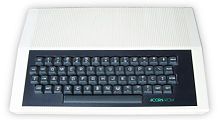
Back Acorn Atom Esperanto Acorn Atom Spanish Acorn Atom Croatian Acorn Atom Italian Acorn Atom Dutch Acorn Atom Portuguese Acorn Atom Russian Acorn Atom Serbian
This article needs additional citations for verification. (February 2013) |
 The Atom was Acorn's first computer to be aimed squarely at the home market. | |
| Manufacturer | Acorn Computers |
|---|---|
| Type | Personal Computer |
| Release date | March 1980 |
| Introductory price | £120 (in kit form), £170 (assembled) |
| Discontinued | 1982 |
| Media | 100KB 5¼-inch floppy disks, Cassette tapes |
| CPU | 1 MHz MOS Technology 6502 |
| Memory | 2 KB RAM (expandable to 12 KB), 8 KB ROM (expandable to 12 KB) |
| Display | 64×64 (4 colours), 64×96 (4 colours), 128×96 (monochrome), 64×192 (4 colours), 128×192 (2 colours), 256×192 (monochrome) |
| Sound | 1 channel, internal loudspeaker |
| Input | Keyboard |
| Power | 8V, 1.5A unregulated DC, 5V regulated inside. |
| Dimensions | 381×241×64 mm |
| Predecessor | Acorn System 3 |
| Successor | BBC Micro |
The Acorn Atom is a home computer made by Acorn Computers Ltd from 1980 to 1982,[1] when it was replaced by the BBC Micro. The BBC Micro began life as an upgrade to the Atom, originally known as the Proton.
The Atom was a progression of the MOS Technology 6502-based machines that the company had been making from 1979. The Atom was a cut-down Acorn System 3 without a disk drive but with an integral keyboard and cassette tape interface, sold in either kit or complete form. In 1980 it was priced between £120 in kit form, £170 (equivalent to £921 in 2023) ready assembled, to over £200 for the fully expanded version with 12 KB of RAM and the floating-point extension ROM.[2]
- ^ Acorn Atom computer, Science Museum Group. Object collection number Y2002.13
- ^ Whytehead, Chris. "Acorn Atom Computers". Chris's Acorns. The Centre for Computing History. Archived from the original on 19 November 2022. Retrieved 28 January 2024.